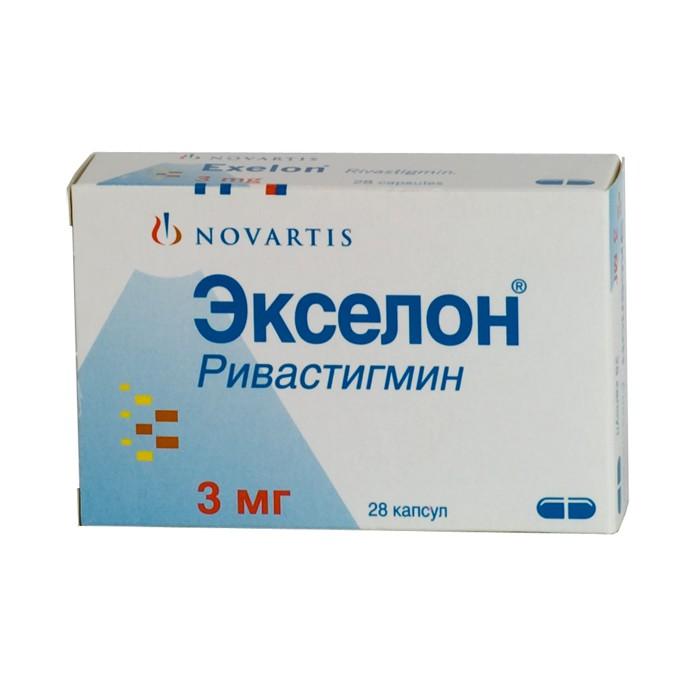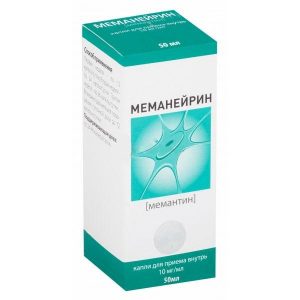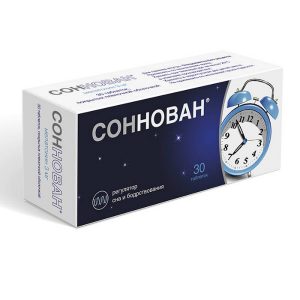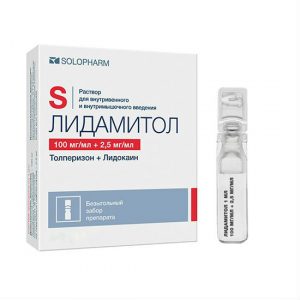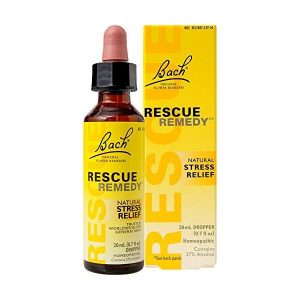Description
Release form
Capsules
Pharmacological action
Exelon is a selective inhibitor of acetyl and butyrylcholinesterase in the brain, used to treat Alzheimer’s disease and dementia in Parkinson’s disease.
Rivastigmine slows down the destruction of the acetylcholine mediator produced by functionally preserved neurons. At the same time, rivastigmine selectively increases the content of acetylcholine in the cerebral cortex and the hippocampus, and, thus, helps to improve cholinergic neural transmission.
Exelon may have a beneficial effect on cognitive decline, associated with acetylcholine deficiency, in particular with dementia associated with Alzheimer’s disease and Parkinson’s disease.
In addition, there is evidence that inhibition of cholinesterases can slow the formation of fragments of the protein precursor of amyloid beta, which is involved in amyloidogenesis, and thus slow the formation of amyloid plaques, which are one of the main pathological signs of Alzheimer’s disease.
Rivastigmine interacts with the target enzyme to form a covalent bond, which leads to temporary inactivation of the enzyme. It has been shown that in healthy young men after taking Exelon at a dose of 3 mg, the activity of acetylcholinesterase in the cerebrospinal fluid (CSF) decreases by approximately 40% during the first 1.5 hours. After reaching the maximum inhibitory effect, the enzyme activity returns to its original level after about 9 hours. It was shown that the activity of butyrylcholinesterase in CSF in young healthy volunteers is reversibly inhibited and is restored to its original value after 3-6 hours. In patients with Alzheimer’s disease, inhibition of rivastigmine activity of acetylcholinesterase in CSF is dose-dependent in the studied dose range (up to the highest dose of 6 mg twice a day). And
inhibition of butyrylcholinesterase is also dose-dependent: a dose of 6 mg 2 times a day causes a decrease in enzyme activity by more than 60% compared to the original. This effect of Exelon persisted for 12 months of therapy (maximum studied period). Statistically significant correlations were shown between the degree of rivastigmine inhibition of both enzymes in the CSF and changes in cognitive functions in patients with Alzheimer’s disease, while the inhibition of butyrylcholinesterase in the CSF reliably and stably correlates with the improvement of the results of memory tests, attention and reaction speed.
The efficacy of Exelon therapy for Alzheimer’s disease has been shown in patients with mild to moderate severity of dementia (10-24 points on a brief scale for assessing mental status, Mini Mental State Examination, MMSE). According to clinical studies, Exelon therapy leads to a significant improvement in cognitive functions (attention, memory, speech, etc.), functional status and activity in everyday life, and also to reduce the severity of the disease and the severity of mental and behavioral manifestations (such as agitation, tearfulness, illusions, hallucinations, etc.).
Studies have shown that the effect of Exelon therapy is observed approximately at the 12th week and persists for 6 months of therapy, while in the control period of time in the group of patients receiving placebo, a decrease in the corresponding indicators was observed.
For dementia associated with Parkinson’s disease, Exelon’s efficacy was demonstrated in a placebo-controlled study lasting 24 weeks in patients with mild to moderate severity of dementia (10-24 points for MMSE). In patients receiving Exelon, a statistically significant improvement in cognitive functions (attention, memory, speech, etc.) was noted, while in patients receiving placebo, similar rates worsened.
Indications
– Mild or moderate Alzheimer’s type dementia: probable Alzheimer’s disease, Alzheimer’s disease.
– Mild to moderate dementia in Parkinson’s disease.
Contraindications
– Hypersensitivity to rivastigmine, other derivatives of carbamate or other ingredients that are part of the drug.
– Exelon is contraindicated in patients with severely impaired liver function, since its use in this population has not been studied.
Caution:
– Exelon, like other cholinomimetic agents, should be used with caution in patients with sinus node syndrome or conduction disturbances6 sino-arthrial block, atrioventricular block.
– Cholinergic stimulation can increase the secretion of hydrochloric acid in the stomach, lead to increased urinary tract obstruction and exacerbation of convulsive syndrome, therefore caution should be exercised when prescribing Exelon to patients predisposed to these conditions.
– Exelon, like other cholinomimetics, should be used with caution in patients with a history of asthma or obstructive airway disease. Taking into account the pharmacodynamic properties of Exelon, it should not be prescribed simultaneously with other cholinomimetic drugs.
During the dose selection period, as with other cholinomimetics, adverse events were noted for a short period after increasing the dose. The severity of adverse events may decrease in response to a decrease in the dose of the drug. Otherwise, Exelon should be canceled.
Use during pregnancy and lactation
The safety of Exelon during pregnancy in humans has not yet been established, therefore, the drug can be prescribed during pregnancy only when the expected success of the treatment exceeds the potential risk to the fetus. It is not known whether rivastigmine is excreted in breast milk. Therefore, during the use of the drug should abandon breastfeeding. Experimental studies have shown that rivastigmine does not have teratogenic properties.
Special instructions
As with other cholinomimetics, when taking rivastigmine, the development of extrapyramidal disorders or an increase in their severity is possible. When using rivastigmine in patients with dementia in Parkinson’s disease, an increase in the severity of motor disorders (including bradykinesia, dyskinesia, gait disturbances), as well as an increase in the frequency and severity of tremor (requiring in some cases the withdrawal of drug therapy) were noted. Patients should be monitored regularly to detect these adverse events.
Impact on the ability to drive vehicles and work with mechanisms In patients treated with Exelon, no impairment of motor function was detected. Nevertheless, the ability of a patient with Alzheimer’s disease to drive vehicles and work with complex mechanisms should be regularly evaluated by the attending physician.
Composition
1 capsule contains: Active substance: rivastigmine (in the form of hydrotartrate) 3 mg.
Excipients: magnesium stearate, methylhydroxypropyl cellulose (hypromellose), microcrystalline cellulose, anhydrous colloidal silicon dioxide, titanium dioxide (E 171), gelatin, yellow iron oxide (E 172), red iron oxide (E 172).
Dosage and administration
Exelon should be taken orally 2 times a day, during breakfast and dinner.
When using the drug in patients who are especially sensitive to the effects of cholinergic drugs, treatment should begin with the use of the drug in a dose of 1 mg 2 times a day.
The initial recommended dose is 1.5 mg (0.75 ml of solution) 2 times a day. If after a minimum of two weeks of treatment there is good tolerance to this dose, it can be increased to 3.0 mg 2 times a day. In the case of good tolerance to the dose taken by the patient, its further increase is possible – up to 4.5 mg 2 times a day and further up to 6 mg 2 times a day – with an interval of at least 2 weeks after each dose increase.
Adverse events, namely nausea, vomiting, abdominal pain, loss of appetite or weight loss observed during treatment, may decrease after skipping one or more doses of the drug. If adverse events persist, the daily dose should be reduced to the previous dose well tolerated by the patient.
Maintenance dose is: from 1.5 mg to 6.0 mg 2 times a day. In order to achieve the best therapeutic effect, the dose should be kept at the maximum well tolerated level.
Maximum daily dose: 6.0 mg 2 times a day.
If the interruption in taking the drug is several days or more, treatment should be resumed with an initial dose to reduce the risk of resuming adverse reactions (eg, severe vomiting). A gradual increase in dose is carried out stepwise, as described above. Exelon’s equal doses, administered as capsules or as an oral solution, are interchangeable.
Side effects
The overall incidence of adverse events with TTC Exelon therapy 9.5 / 24 h (50.5%) was lower compared with oral therapy using capsules in a daily dose of 3-12 mg (63. 3%) (for comparison, in the placebo group, this indicator was 46%).
The most frequent reaction from the digestive system. Nausea (7.2%) and vomiting (6.2%) were observed much less frequently with the use of TTC Exelon 9.5 mg / 24 h compared with capsules for oral administration, 23.1% and 17.0%, respectively (in the placebo group, the same indicators were 5.0% and 3.3% )
The frequency of adverse reactions in patients (291 people) with Alzheimer’s type dementia who received TTC Exelon therapy (all dosages) was determined as follows: very often (? 1/10), often (? 1/100, less than 1/10) , infrequently (? 1/1000, less than 1/100), rarely (? 1/10 000, less than 1/1000), very rarely (less than 1/10 000), undesirable reactions are presented separately, the frequency of which is not precisely established.
Infectious and parasitic diseases: often urinary tract infections.
From the side of metabolism: often – anorexia.
From the nervous system: often – anxiety, depression, delirium, headache, fainting very rarely – extrapyramidal disorders frequency unknown – hallucinations.
From the cardiovascular system: infrequently – bradycardia, cerebrovascular accident.
From the digestive system: often – nausea, vomiting, diarrhea, dyspepsia, abdominal pain infrequently – stomach ulcer.
Dermatological reactions: often a rash.
On the part of the body as a whole and reactions at the site of TTC attachment: often – erythema, swelling and itching, irritation, inflammation at the site of application, increased fatigue, asthenia, fever, weight loss.
In clinical trials when using the drug in doses of more than 9.5 mg / 24 h, the following adverse reactions were noted much more often than in the TTC Exelon 9.5 mg / 24 h and placebo groups: dizziness, insomnia, agitation, decreased appetite, atrial fibrillation, heart failure ( possibly related to an increase in dose). The frequency of these adverse reactions during therapy with TTC Exelon 9.5 mg / 24 h was similar to that in the placebo group.
The following adverse reactions were observed only with capsule or Exelon oral solution and were not registered with TTC Exelon 9.5 mg / 24 h: dizziness (very often), agitation, drowsiness, general malaise, tremor, confusion, sweating (often), insomnia, occasional falls, increased liver activity (sometimes), convulsions, duodenal ulcer, angina pectoris, myocardial infarction (rare), arrhythmias (e.g. AV block, atrial fibrillation, tachycardia), increased blood pressure, pancreatitis, gastrointestinal bleeding, hallucinations (very rarely) in some cases – severe vomiting, leading to rupture of the esophagus (frequency unknown).
Dermatological reactions
When using TTC Exelon, the most frequently observed reddening of the skin (erythema) at the site of application, usually disappearing in most patients within 24 hours, in clinical trials with TTC Exelon 9.5 mg / 24 h, mild (21.8%), moderate (12.5%), severe (6.5%) redness of the skin, mild itching (11.9%), moderate (7.3%) and severe (5%) degree.
During therapy with TTC Exelon 9. 5 mg / 24 h, pruritus and erythema were observed in 1.7% and 1.1% of patients, respectively. Most skin reactions developed only in the area of TTC application. When using TTC Exelon 9.5 mg / 24 h, discontinuation of drug treatment due to the development of dermatological reactions was noted in only 2.4% of cases.
Drug interactions
Rivastigmine is metabolized primarily by hydrolysis with the participation of esterases. The metabolism of rivastigmine with the participation of the main isoenzymes of cytochrome P450 occurs to a minimum. Therefore, the pharmacokinetic interactions of rivastigmine with other drugs, metabolized by these enzymes is unlikely.
In healthy volunteers, no pharmacokinetic interaction between rivastigmine and digoxin, warfarin, diazepam, or fluoxetine was detected. The increase in prothrombin time caused by warfarin did not change with the administration of rivastigmine. With the simultaneous use of rivastigmine and digoxin, no adverse effect on intracardiac conduction was noted.
Concomitant use of rivastigmine with commonly used drugs such as antacids, antiemetics, antidiabetic drugs, central antihypertensive drugs, beta-blockers, calcium channel blockers, drugs that have a positive inotropic effect, antianginal drugs, non-steroidal anti-inflammatory drugs, e analgesics, benzodiazepines and antihistamines were not accompanied by any changes in the kinetics of rivastigmine or an increased risk of clinically significant adverse events. During anesthesia, rivastigmine, being an inhibitor of cholinesterase, can enhance the effects of depolarizing muscle relaxants (succinylcholine type muscle relaxants).
Overdose
Symptoms. The accidental overdose of the drug in most cases was not accompanied by any clinical manifestations of almost all patients continued treatment with Exelon. At an overdose nausea, vomiting, diarrhea, the expressed increase in BP, hallucinations were noted. Given the vagotonic effect of cholinesterase inhibitors on heart rate (HR), it is impossible to exclude the occurrence of brachycardia and / or syncope. In one case, 46 mg of the drug was taken after a conservative treatment after 24 hours complete recovery was observed.
Treatment. Since the half-life of rivastigmine from plasma is about 1 hour and the duration of acetylcholinesterase inhibition is about 9 hours, it is recommended not to use Exelon for the next 24 hours in cases of asymptomatic overdose. If overdose is accompanied by severe nausea and vomiting, the use of antiemetic agents should be considered. If other undesirable phenomena occur, appropriate symptomatic treatment is carried out if necessary.
With significant overdose, atropine may be used, the initial dose of which is 0.03 mg / kg intravenously, the subsequent dosage depends on the clinical effect. The use of scopolamine as an antidote is not recommended.
Storage conditions
At a temperature not exceeding 30 ° C.
Shelf life
5 years
Active ingredient
Rivastigmine
dosage form
capsules
Possible product names
EXELON 0.003 N28 CAPS
Exelon 3mg Caps. X28 (R)
Exelon caps. 0.003 x 28
Exelon caps. 3mg N28
excelon caps. 3mg N28 Spain
Novartis Farma Stein AG, Switzerland
